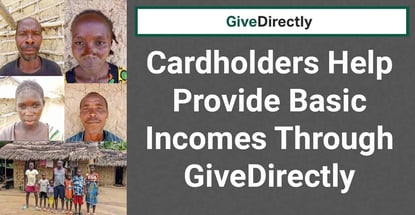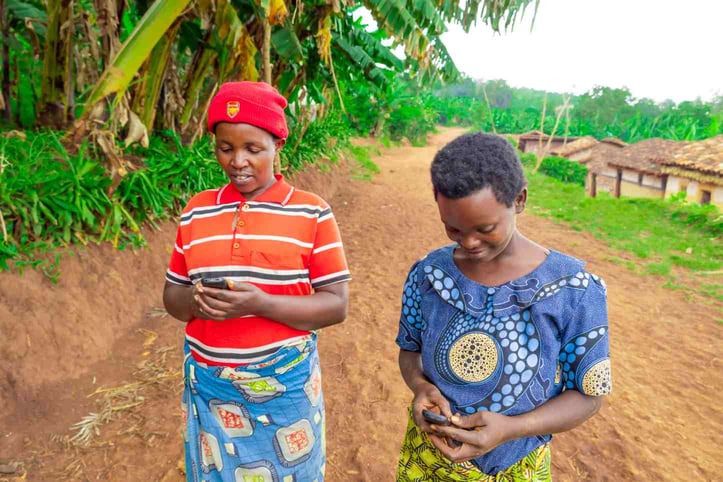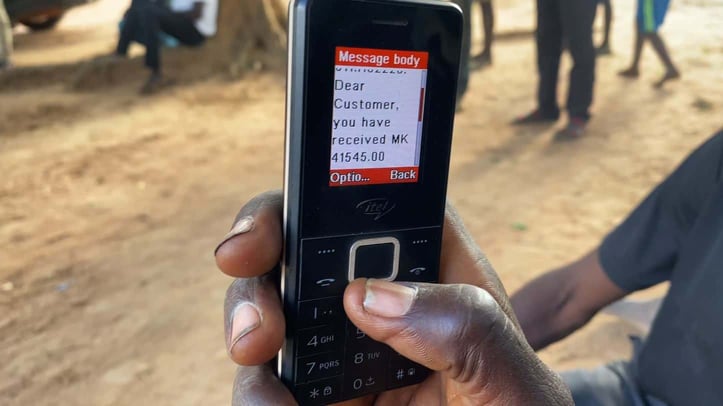
Our experts and industry insiders blog the latest news, studies and current events from inside the credit card industry. Our articles follow strict editorial guidelines.
In a Nutshell: The question for cardholders contemplating charitable support for an antipoverty initiative is who should be in charge when the money changes hands. The belief at GiveDirectly is that the most effective form of charity is direct cash payments with no strings attached. Rigorous research bolsters the view that the poorest global households make the most productive use of cash infusions when they are free to choose how to help themselves. Cardholders who support GiveDirectly give cash directly and encourage efforts to extend a universal basic income.
The World Bank establishes an international poverty line by comparing economic productivity and living standards between countries. The figure changes with the cost of basic food, clothing, and shelter. In 2022, the World Bank increased the international poverty line to $2.15 per day.
That means adults existing on less than $2.15 per day are said to be living in extreme poverty.
Critics argue that the international poverty line is an incomplete measure of socioeconomic well-being. Nevertheless, the World Bank estimated that nearly 700 million people lived below the international poverty line at the end of 2022.
For Lydiah Wangechi, Regional Director at the global nonprofit GiveDirectly, the question is why. Economic mismanagement and social disorder surely contribute to poverty, but research also shows that the millions in official development assistance pumped into the poorest nations has little effect.

Many argue without evidence that there’s something wrong with people in those nations, that they either lack motivation or spend resources irresponsibly. Wangechi and the team at GiveDirectly have an alternate, evidence-based explanation: Most assistance comes with strings attached that render it ineffective.
GiveDirectly’s mission is to put cash directly into the hands of poor people without conditions, putting them wholly in charge of their futures.
“The development aid sector doesn’t have a very good track record in lifting people out of poverty,” Wangechi said. “Over and over, the evidence shows that people can determine the best path out of poverty for themselves.”
Wangechi and the GiveDirectly team are skeptical that a development aid executive in a New York office can dispense assistance more effectively than a poor Kenyan with dreams but no cash can use it.
“Cash offers choice,” Wangechi said. “GiveDirectly puts power and agency in the hands of the people it supports and allows them to design their pathways for themselves.”
Granting People in Poverty the Dignity of Choice
GiveDirectly is an international nonprofit that enables donors to send money directly to the world’s poorest households. The philosophy behind the mission is that poor people deserve the dignity of choosing the best way to improve their lives. Nothing grants more choice than cash.
GiveDirectly has delivered more than $700 million to people in need since 2009, reaching about 1.5 million individuals, mainly in African nations but also in Turkey, the Caribbean, and even the US.
Cardholders may join more than 110,000 direct donors to help fund programs for poverty relief, basic income, emergency relief, refugee assistance, and climate survival. Donors may target their support or contribute where the support is most needed.

Wangechi said GiveDirectly usually gives large lump sum payments to encourage entrepreneurship in developing economies. Assistance also takes a basic income design, with payments as low as $40 monthly lifting people above the international poverty line. Either way, people receiving the aid are totally in charge after money is dispensed.
“GiveDirectly was an early mover in granting cash at scale and has been instrumental in driving uptake of the direct-cash methodology with governments and funders,” Wangechi said. “We’re also building spaces for people to talk more about direct cash giving.”
Wangechi sees clear advantages in GiveDirectly’s strategy because one-size-fits-all assistance will likely always fall short.
“I’ve seen programs go into communities and tell people to keep a cow or grow sorghum, and the reality is that not everybody wants to be a farmer,” she said. “Direct cash is the most researched and efficient antipoverty intervention. Money penetration via mobile technology allows poor people everywhere to participate in the global economy. And cash has a catalytic effect not just in the household that receives it but also in the community.”
Research Supports Direct Cash Transfers
Wangechi said research decisively contradicts the contention that extending agency to impoverished people is irresponsible. GiveDirectly maintains a Cash Evidence Explorer reporting the results of more than 300 independent studies, including peer-reviewed papers, working papers, and program reports.
An overview of this research establishes that people living in extreme poverty rarely get to decide how to spend aid money despite a consensus among reviewers that cash is an effective way to dispense support.
The research also conclusively smashes the stereotype that recipients of cash systematically waste or misuse it. Instead, they typically put the money toward improving some aspect of their lives. Direct cash also produces a multiplier effect in households and communities.
“We’ve seen a broad range of really interesting outcomes,” Wangechi said.

For example, people receiving basic income assistance demonstrate more appetite to take on financial risks. Wangechi spoke to one recipient who felt more confident using other income sources to start a business because of the guaranteed money coming in.
Wangechi also reports that cash creates intangible benefits such as greater peace of mind and household harmony.
“People are in the right frame of mind to take on new challenges,” she said.
The research suggests that cash can drive many positive changes in people’s lives, including educational attainment, better health and nutrition, more intentional savings and investment, a greater chance of employment, and an overall feeling of empowerment.
GiveDirectly supplements research on cash giving with randomized controlled trials to measure its impact and answer public policy questions. As of early spring 2024, when this article went to press, it planned to publish results showing reduced child mortality due to direct cash giving.
“This was not something we expected to see, but it makes sense because people receiving assistance can now afford to take their children to the clinic rather than play a wait-and-see game,” Wangechi said.
Driving the Debate Regarding Universal Basic Income
The conclusion, GiveDirectly argues, is that no one should have to live on $2.15 a day when another world is possible. Individual cardholder donations help support GiveDirectly’s efforts to provide a guaranteed basic income to impoverished people as the best way to move society and the economy forward.
The most extensive and longest-term UBI study is a living laboratory: GiveDirectly’s 12-year, $30 million UBI project in Kenya has distributed millions to more than 23,000 individuals in 195 villages.
The program compares the effects of a long-term UBI at $22.50 monthly for 12 years, a short-term UBI at $22.50 monthly for two years, and large lump-sum payments of $500. A cohort of 100 villages acts as a control group and receives no assistance. The study looks for changes in economic well-being, health, social well-being, macroeconomic well-being, and financial preferences.
“We’re trying to answer questions definitively about whether people become lazy if they receive a guaranteed income over 12 years,” Wangechi said. “Or, does their appetite to take risks and start businesses increase?”
GiveDirectly is scaling programs to grant large lump-sum transfers to prospective entrepreneurs in Rwanda and Malawi. The organization worked closely with the governments in those nations to implement the pilot projects.
“They have incorporated large lump-sum transfers as interventions in their national development strategies,” Wangechi said.
GiveDirectly is also rolling out cash-plus projects that acknowledge the limitations of direct giving and seek partnerships with like-minded organizations to drive positive social progress. These initiatives establish GiveDirectly as an exemplary global nonprofit dedicated to overturning assumptions in favor of evidence-based solutions.
“I encourage people to support our work,” Wangechi said. “The reality is that poverty is not due to lack of ability or mental capacity. It’s due to lack of money.”


![Average Credit Card Debt in American Households ([current_year]) Average Credit Card Debt in American Households ([current_year])](https://www.cardrates.com/images/uploads/2018/01/avgdebt.png?width=158&height=120&fit=crop)

![9 Best Credit Cards for Students With No Income ([updated_month_year]) 9 Best Credit Cards for Students With No Income ([updated_month_year])](https://www.cardrates.com/images/uploads/2017/11/noincome.png?width=158&height=120&fit=crop)
![12 Best Credit Cards for Low-Income Earners ([updated_month_year]) 12 Best Credit Cards for Low-Income Earners ([updated_month_year])](https://www.cardrates.com/images/uploads/2018/01/low-income2.jpg?width=158&height=120&fit=crop)

![15 FAQs: Annual Income on Credit Card Applications ([updated_month_year]) 15 FAQs: Annual Income on Credit Card Applications ([updated_month_year])](https://www.cardrates.com/images/uploads/2020/11/shutterstock_394244284.jpg?width=158&height=120&fit=crop)
![7 Credit Cards For High Debt-to-Income Ratios ([updated_month_year]) 7 Credit Cards For High Debt-to-Income Ratios ([updated_month_year])](https://www.cardrates.com/images/uploads/2021/01/shutterstock_232260670.jpg?width=158&height=120&fit=crop)
![Credit Card Ownership By Age, Income, Gender & Race in [current_year] Credit Card Ownership By Age, Income, Gender & Race in [current_year]](https://www.cardrates.com/images/uploads/2021/01/shutterstock_1524276980.jpg?width=158&height=120&fit=crop)